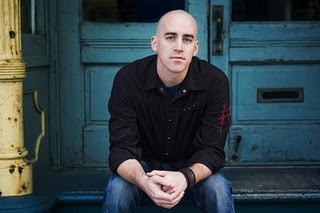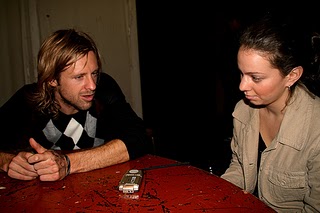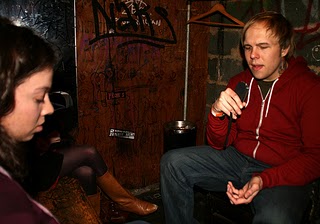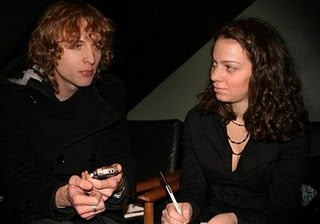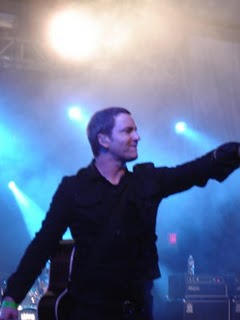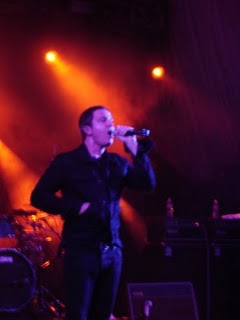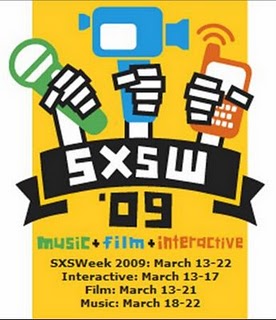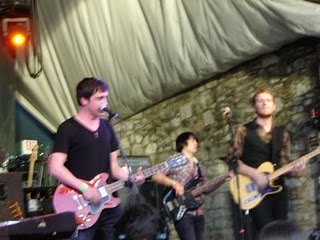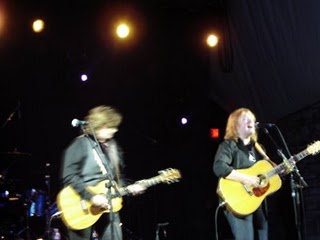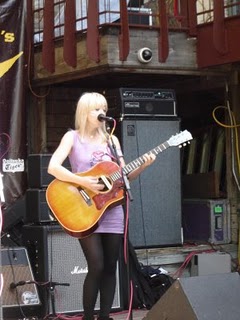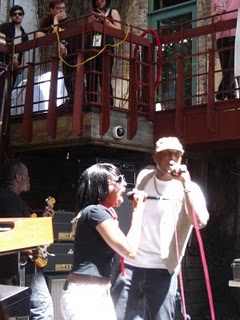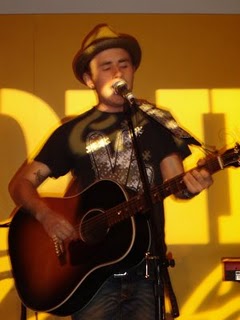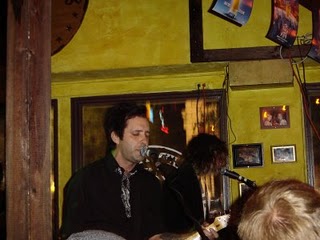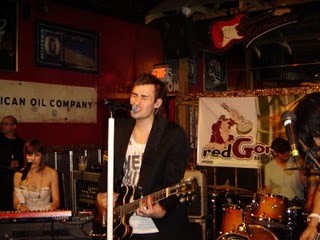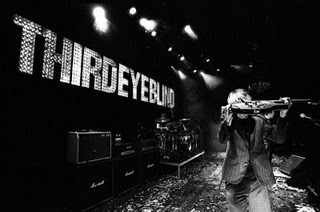 Releasing their first full-length album in over five years, Ursa Major (due out later this year) promises Third Eye Blind fans the music and undeniably unforgettable lyrics they are known for. Take already released track, “Non-Dairy Creamer” which begs the question, “Whose side are you on? Are you real or fake?” Listen to “Non-Dairy Creamer” here.
Releasing their first full-length album in over five years, Ursa Major (due out later this year) promises Third Eye Blind fans the music and undeniably unforgettable lyrics they are known for. Take already released track, “Non-Dairy Creamer” which begs the question, “Whose side are you on? Are you real or fake?” Listen to “Non-Dairy Creamer” here.
Jenkins took some time out to discuss at great length the ever changing music industry and ways the band is adapting, including Indaba Music’s interactive web program “Studio Access” where fans can create their own mixes of new 3eb tracks before the album is released. Read below for the exclusive interview including Jenkins’ take on the industry, his band (“Third Eye Blind was this band that was marketed and processed and packaged in a way that we didn’t really recognize”) as well as the upcoming release. You can listen to the MP3 of my interview with Stephan Jenkins here.
What have you been up to the past few years since you released Out of the Vein?
Well, I produced Vanessa Carlton’s album Harmonium. That was a real process. I’m so proud of that album; I think it’s a really beautiful album. That album is on the old record company model. I just don’t think it’s the right model for her at all because we’ve become so much smaller and closer a music community and we can’t tolerate as listeners that sort of layers of obfuscation that I think record companies bring. What I’ve done in the last two years was founded my own label, that’s called Assembly. It’s distributed through RED, which is a very tight, focused, dedicated group of music fans. So I’ve really changed my whole structure. Then I built a studio in this incredible Victorian mansion in San Francisco. It’s got these 30-foot glass ceilings. It was a house that was built for music at the turn of the century so it’s an amazing place.
Finally, the third thing is that we went out and played and toured this year and we had more people come to our shows this year than had ever come before. I think the same thing happened with Weezer where there was this real sort of rediscovery of the band. Third Eye Blind was this band that was marketed and processed and packaged in a way that we didn’t really recognize. After all that marketing wore off, what you have left is a playlist. And fans discovered that in the ways that they do, which was very personal for them and then they share it with each other. And that’s what has been happening and it’s been so great! It’s really this honest and direct exchange between our music and the people who engage it. So we toured and we’ve been writing this album and have been working on this album and I think it’s an album that is very much inspired by our fans.
It sounds like it. You’re partnering with Indaba Music for “Studio Access,” which basically allows fans to compete in mixing your songs.
Aren’t they great? They are so talented! They’re amazing. A lot of it is just like, “Darn, why didn’t I think of that?” I love to see our music go in and see someone else’s creativity and content. We want to use the technology that’s available to get closer to people, to actually make the community tighter and not have the sense of people being isolated and kept by themselves through technology and instead, find out what’s going on that’s specific to them. To find their people and their groups through coming together through music and each other and finding problems that they care about and ways that they can express themselves creatively through music. The creative expression part of that is definitely something that’s happening through Indaba. It really helps us as well because we are fueled by it. We wrote this album on the road in front of audiences, we tried songs out in front of them. I think the sound of this album has a big reverberant confident sound that comes from that feeling that we’ve had on the road. We always want to maintain that as part of the sound of making the record.
How much of a play are the fan’s remixes a part of the recording process?
Well, it hasn’t affected the recording process. But, one guy took these marching drums that Brad plays and he put them at the beginning of the song and I said, “You know what, that’s how we are going to opening our tour next year,” which would be super cool. So, that’s a way in which somebody else’s idea sparks an idea in us.
What can fans expect from this album?
Well, you probably got to hear one song, “Non-Dairy Creamer” and got some sense of it. I think “Non-Dairy Creamer,” the song itself – the arrangement keeps building and growing. We love the sense of unstoppable momentum for one. Two, I think that lyrically, I don’t know if we are an architect of emocore. But that’s what some of these magazines have said. I thought we were just fighting the Smashing Pumpkins, but I think that’s a sense of internal politics and really trying to speak to those was our contribution to emo. Me, I have no idea because I had never heard of the phrase until years after we made the record so I had nothing to do with it in trying to design something. Lyrically the difference is, on this record, instead of internal politics, this is more extroverted, it’s more external politics.
I think that’s very reflective of the times we’re in. I think that we’ve been stupefied and dumbfounded by a criminal and negligent administration over the last eight years. I think that the generation that really embraces the music is beginning to get its voice back and we’re beginning to say, “Wow, rebellion is American and we need to begin to speak up the way we know we should.” That’s been my sense in finding an outward voice. “Non-Dairy Creamer” is really just about being real versus being fake. There are all these phrases like, “Threat level orange.” What the fuck is that? All it is is asking you to be afraid. I think that being afraid is a particularly un-American concept that George Bush wants to ram down our throats. And so does John McCain and all his off-takes. “Oh be scared of Barack Obama because I have nothing to offer” crap. I think it is shameless and we are now able to call it for what it is. The song is saying, “Whose side are you on? Are you real or fake?”
Is “Non-Dairy Creamer” your first single?
Well, I think that’s a song we just put out first. But, the concept of a single is like, “Is it gonna get banged 40 times a week on MTV?” doesn’t really exist anymore. There’s really no such thing. I don’t even know what a single is, you know? Is it the track that we pay a marketing guy to go push on the radio? No, no it’s not. It’s just a song. They’re all singles.
You were huge in the 90s during the MTV era. How different is the music industry for you now? Do you think it would be easier if you started today?
I think it was very difficult in the 90s. It took a very long time and one of the reasons why was because music needed to be funneled. The outlets for music were so tightly controlled by a few people who had pretty much no interest in music or understanding or sensitivity to music. They were interested in one thing. They were interested in power and they were interested in competing with each other and egos. And they were interested in smashing that model into the ground, which in essence is what they did. They were these big, powerful dinosaurs that were hit by the comets of digital music. So now what’s happened is it’s become totally democratized. What I’m saying is, the jury is no longer rigged. I think that people with good music can go out and get it put out and it’s eligible to find audiences in ways that it wasn’t before. So I think in a lot of ways, it probably would have been easier for us to come out now. It’s really more exciting because we always have the answer for somebody else. In the end we’re still in some way working for the man, which I never wanted to do.
What is your writing process like? Is it any different on this album than previous albums since I know you said you wrote most of these songs while on the road?
What I do is I tend to write down ideas that occur to me. Then they often times take on some cohesion. The other thing I’ll do is I’ll have an idea and that idea will come in a rhythm. I’m a drummer by training so a lot of what I do is rhythmically based. That’s my primary mode of organizing some kind of emotion or provocation into a piece that makes that emotion travel. That’s the best I could put it.
I read that for this album you had more trouble thinking of lyrics than in the past.
Yeah. I still have trouble with some of the songs and the lyrics because I think that the reason for our shocking longevity is the lyrics. If I don’t feel the idea, the governing ghost of that concept inside the lyrics, it can really, really stump me. I have songs I’ve worked on for three years and I can’t get the lyrics right. Then another song like “Non-Dairy Creamer” just kind of comes together pretty fast.
Do you have any ways that you work on your writer’s block?
No. I just engage in a lot of self-hate and then I procrastinate. I do other things instead of working on music and put it off. That’s why we’re so slow at making records.
Do you have a tentative release date for Ursa Major?
Yeah. March. We’re going to put out “Non-Dairy Creamer” sometime in November digitally. So it will be a digitally release of that and a duet with Kimya Dawson. Kimya’s a friend of mine; she and I did a song on the last album. It will be a song called “Why Can’t You Be.” It’s a back and forth. One thing I love about her voice is its extremely distinctive and totally authentic and that’s a very rare combination plus she’s a really good lyricist. She’s very musical. One thing that’s great about Kimya is she’s got great pitch. I like our voices put together.
You’re also planning to release a follow up, Ursa Minor?
Ursa Minor, yeah. Ursa Major is the constellation of the bear. It’s good for us because we’ve been hibernating and now we’ve awakened and we are hungry for spring and we want to feed and we want to thrive.
Everyone on the boards seems to be curious about your old bassist, Arion. Is he playing on the next album and touring with you?
We love Arion and he’s just had a lot of personal struggles. So the band is not a working place for him right now, but he did play bass and actually co-wrote a song called “Red Star” with me and I love that song. I think he’s very talented, but we’ll be having other people play bass with us. But it’s not because we don’t love Arion, because we really do.
Be sure to check out Third Eye Blind’s latest EP release, Red Star and their latest tour dates on MySpace and watch out for their new Web site, coming soon at www.thirdeyeblind.com.


